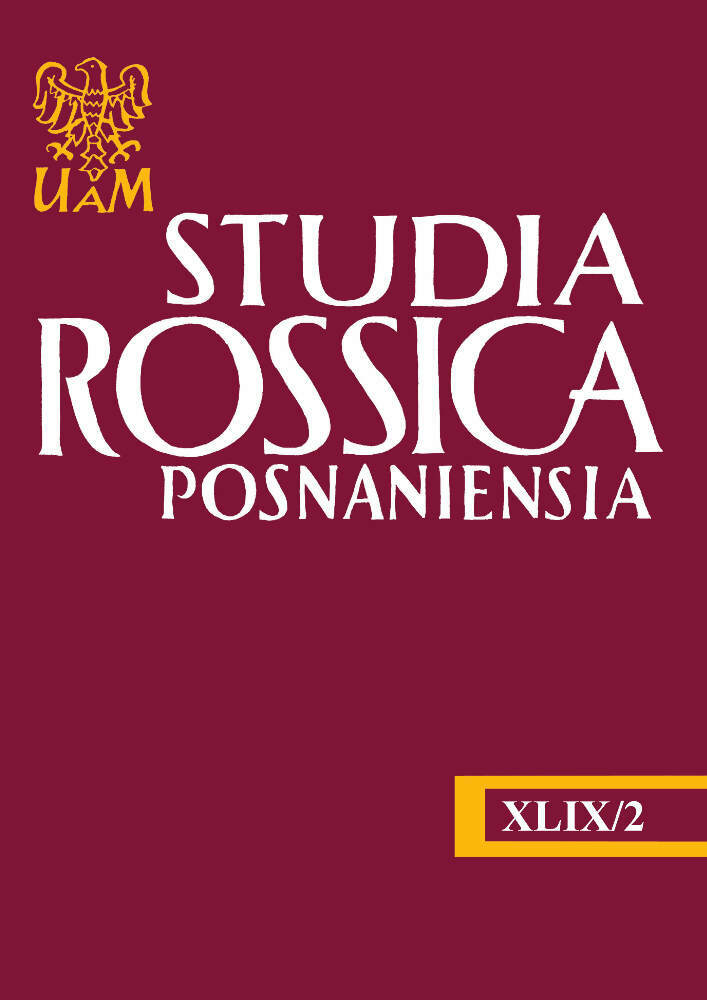Abstract
Vladimir Sorokin is one of the representatives of Russian postmodernism and one of the most translated contemporary Russian authors in Europe. His work reflects an alternative to the “accepted” Russian reality, focusing on its understanding and the influence it has on the Russian people. The author uses artistic means of expression without embellishment and through his works he reflects not only the political, economic and social situation, but also his views and attitudes as a resident of Russia. In our article we present the time map of Russia according to Sorokin as reflected in three novels: The queue (1985), representing the Soviet system in the country, Their four hearts (1994), depicting the collapse of the USSR, and Day of the oprichnik (2006), portraying the beginning of the XXI century. The article is devoted to the significant epochs of Russian history through the eyes of the author, who is trying to capture the mentality, beliefs and opinions of Russian people in his literary works. The analysis of the main periods of Russian history and their influence on the people, as reflected in Sorokin’s oeuvre, allows us to understand their attitude to the current situation in Russia.
References
Afanasʹev, Aleksandr, ed. Narodnye russkie skazki. Sankt-Peterburg, Moskva, Rečʹ, 2017.
Barthes, Roland. “The death of the Author”. Roland Barthes. The rustle of language. Trans. Richard Howard. New York, Hill and Wang, 1986, pp. 49–55. Web. 30.01.2024. https://www.d.umn.edu/~cstroupe/handouts/8500/barthes_death.pdf.
Blair, Elaine. “The wait”. The Nation, 13.04.2009, pp. 25–28. Web. 7.02.2024. https://www.thenation.com/article/archive/wait-vladimir-sorokin/.
Epstein, Mikhail. “The philosophical implications of Russian conceptualism”. Journal of Eurasian Studies, 1, 2010, pp. 64–71. Web. 7.02.2024. https://www.sciencedirect.com/science/article/pii/S1879366509000098#sec3. DOI: https://doi.org/10.1016/j.euras.2009.11.008
Erofeev, Viktor. Russkie cvety zla. Moskva, Podkova, 1997.
Genis, Aleksandr. “Čuznʹ i žido”. Aleksandr Genis. Ivan Petrovič umer. Moskva, Novoe literaturnoe obozrenie, 1999, pp. 72–81.
Glanc, Tomáš. “«Trvá to celou věčnost!» Fronta Vladimira Sorokina 2003: souvislosti tvorby” [preface]. Vladimir Sorokin. Fronta. Trans. Jakub Šedivý. Praha, Malá Skála, 2003, pp. 5–19.
Gricanov, Aleksandr, Marina Možejko, ed. Postmodernizm. Ènciklopediâ. Minsk, Interpresservis, 2001. Web. 28.03.2024. https://www.gumer.info/bogoslov_Buks/Philos/PostModern/_77.php.
Grigoryeva, Nadezhda. “Speak, heart...: Vladimir Sorokin’s mystical language”. Vladimir Sorokin’s languages. Slavica Bergensia, 11. Ed. Tine Roesen, Dirk Uffelmann. Bergen, University of Bergen, 2013, pp. 108–127. Web. 14.03.2024. https://boap.uib.no/books/sb/catalog/view/9/8/163.
Ivanov, Igorʹ . “Pojdi tuda – ne znaû, kuda; prinesi to – ne znaû, čto”. Èsse na temu svobody. Web. 16.01.2024. https://spbda.ru/publications/svyaschennik-igor-ivanov-poydi-tuda-ne-znayu-kuda-prinesi-to-ne-znayu-chto-esse-na-temu-svobody/.
Koshino, Go. “Illusion and mirror. Images of China in contemporary Russian literature”. Eurasia’s regional powers compared – China, India, Russia. Ed. Shinichiro Tabata. London, Taylor & Francis, 2014. Web. 12.03.2024. https://www.google.sk/books/edition/Eurasia_s_Regional_Powers_Compared_China/AHbfBQAAQBAJ?hl=sk&gbpv=1.
Kupka, Valerij. “V nákaze opričniny”. Vladimír Sorokin: Tvorca mnohých tvárí: Interpretačné podoby v slovenskom kultúrnom priestore. Ed. Zuzana Lorkova. Bratislava, Stimul, 2011, pp. 35–36.
Kusa, Maria. “Sorokin v slovenskej recepcii ako správa (?) o stave kultúrnych priestorov”. Súčasný výskum literárnych procesov v slovenskej a ruskej literárnej vede. Ed. Eva Maliti, Jurij Azarov. Bratislava, Slovak Academic Press, 2012, pp. 107–118.
Lippard, Lucy. Six years: The dematerialization of the art object from 1966 to 1972. Berkeley, University of California Press, 1973. Web. 23.02.2024. https://monoskop.org/images/0/07/Lippard_Lucy_R_Six_Years_The_Dematerialization_of_the_Art_Object_from_1966_to_1972.pdf.
Lorkova, Zuzana. “Preklady V. Sorokina v slovenskom kultúrnom priestore”. Vladimír Sorokin: Tvorca mnohých tvárí: Interpretačné podoby v slovenskom kultúrnom priestore. Ed. Zuzana Lorkova. Bratislava, Stimul, 2011a, pp. 16–25.
Lorkova, Zuzana. “Problematika perevoda proizvedeniâ Serdca četyreh V. Sorokina”. Vladimír Sorokin: Tvorca mnohých tvárí: Interpretačné podoby v slovenskom kultúrnom priestore. Ed. Zuzana Lorkova. Bratislava, Stimul, 2011b, pp. 80–84.
Lorkova, Zuzana. “Východ verzus Západ v diele Opričníkov deň”. Vladimír Sorokin: Tvorca mnohých tvárí: Interpretačné podoby v slovenskom kultúrnom priestore. Ed. Zuzana Lorkova. Bratislava, Stimul, 2011c, pp. 64–72.
Mamleev, Ûrij. “Smertʹ râdom s nami”. Ûrij Mamleev. Osnovnye tajny. Moskva, Vagrûs, 2002, pp. 169–178.
Mattova, Lucia. “Sorokinove dramatické texty v preklade J. Štrassera”. Vladimír Sorokin: Tvorca mnohých tvárí: Interpretačné podoby v slovenskom kultúrnom priestore. Ed. Zuzana Lorkova. Bratislava, Stimul, 2011, pp. 85–92.
Mežieva, Marina, Natalʹâ Konradova. Okno v mir: sovremennaâ russkaâ literatura. Moskva, Russkij âzyk. Kursy, 2006.
Odaha, Tomáš. Maxim Gorkij: Na dně [review]. Web. 16.01.2024. http://www.odaha.com/tomas-odaha/recenze/cetba/divadelni-hry/maxim-gorkij-dne.
Pisar, Vlado. Sorokin: Rusko je stále groteska. Web. 16.01.2024. http://kultura.pravda.sk/kniha/clanok/39048-sorokin-rusko-je-stale-groteska/.
Roesen, Tine, Dirk Uffelmann. “Vladimir Sorokin’s languages: An introduction”. Vladimir Sorokin's languages. Slavica Bergensia, 11. Ed. Tine Roesen, Dirk Uffelmann. Bergen, University of Bergen, 2013, pp. 8–24. Web. 1.03.2024. https://boap.uib.no/books/sb/catalog/view/9/8/160.
Shvankmajer, Milan. Dějiny Ruska. Praha, Lidové noviny, 2004.
Skrynnikov, Ruslan. Reign of terror: Ivan IV. Leiden, Brill, 2015. Web. 26.02.2024. https://books.google.sk/books?id=UP7dCgAAQBAJ. DOI: https://doi.org/10.1163/9789004304017_004
Smirnov, Igorʹ. Oskorblâûŝaâ nevinnostʹ. 1995. Web. 30.01.2024. https://srkn.info/criticism/smirnov2.shtml.
Smirnov, Igorʹ. “Vidimyj i nevidimyj miru ûmor Sorokina”. Mesto pečati, 10, 1997, pp. 60–76. Web. 13.03.2024. https://srkn.info/criticism/smirnov1.shtml.
Sorokin, Vladimir. Den opričníka. Trans. Libor Dvořák. Praha, Pistorius & Olšanská, 2009a.
Sorokin, Vladimir. Fronta. Trans. Jakub Šedivý. Praha, Malá Skála, 2003.
Sorokin, Vladimir. Očeredʹ. Moskva, Corpus, 2018. Web. 9.02.2024. https://www.litres.ru/book/vladimir-sorokin/ochered-124915/chitat-onlayn/.
Sorokin, Vladimir. Opričníkov deň. Trans. Ján Štrasser. Bratislava, Kalligram, 2008.
Sorokin, Vladimir. “Putin sedí na vrchole rozpadávajúcej sa pyramídy moci”. Trans. Ján Štrasser. Dennik N. 26.03.2022. Web. 9.02.2024. https://dennikn.sk/2784166/putin-sedi-na-vrchole-rozpadavajucej-sa-pyramidy-moci/.
Sorokin, Vladimir. Srdcia štyroch. Trans. Ján Štrasser. Bratislava, Kalligram, 2009b.
Stastka, Tomáš. V opozícii nemáme hrdinov. Vedia sa akurát tak nechať zavrieť, myslí si slávny ruský spisovateľ. Web. 9.02.2024. https://hnonline.sk/svet/96083453-v-opozicii-nemame-hrdinov-vedia-sa-akurat-tak-nechat-zavriet-mysli-si-slavny-rusky-spisovatel.
Toda, Mirek. “Homo sovieticus nevymrel, len zmutoval: So spisovateľom Vladimírom Sorokinom o trhaní kníh, komsomolcoch, undergrounde, aj o Putinovi”. Sme. 8.10.2009. Web. 28.03.2024. https://kultura.sme.sk/c/5052288/homo-sovieticus-nevymrel-iba-zmutoval.html.
Trefilova, Anna. “Tenʹ opričnika”. Diletant, 1, 2012, pp. 58–59. Web. 16.01.2024. http://img-fotki.yandex.ru/get/2708/85415274.7/0_63968_802182d8_orig.
Uffelmann, Dirk. “Lëd tronulsia. The overlapping periods in Vladimir Sorokin’s work from the materialization of metaphors to fantastic substantialism”. Landslide of the norm: Language culture in post-Soviet Russia. Slavica Bergensia, 6. Ed. Ingunn Lunde, Tine Roesen. Bergen, University of Bergen, 2017, pp. 100–125. Web. 14.03.2024. https://boap.uib.no/books/sb/catalog/view/3/5/113.
Vargová, Zuzana. Súčasné Rusko v prózach Vladimíra Sorokina [diploma thesis]. Nitra, Univerzita Konštantína Filozofa, Filozofická fakulta, Katedra rusistiky, 2013. Web. 8.01.2024. https://opac.crzp.sk/?fn=detailBiblioForm&sid=B3BB44064DB947D4D2BF3E4BF4B0.
Zirin, Mary. The queue [review]. Web. 29.01.2024. https://www.publishersweekly.com/978-0-930523-44-2.
License
Copyright (c) 2024 Zuzana Kozárová

This work is licensed under a Creative Commons Attribution-NonCommercial-ShareAlike 4.0 International License.

